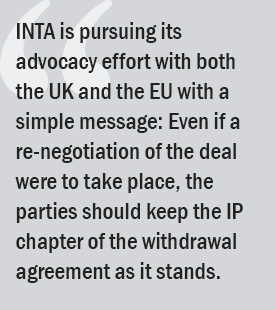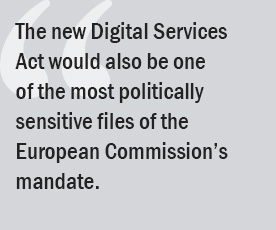New European Commission to Focus on Green Deal and Online Liability Regime
Published: August 15, 2019
 The process towards a new European Commission (EC) term (November 2019‒October 2024) reached an important benchmark on July 16, 2019, with the narrow confirmation of Ursula von der Leyen (Christian Democrat EU People’s Party-EPP, Germany) as the EC’s new president. The vote count was 383 in favor of Ms. von der Leyen, and 327 against, with 374 votes needed to win the presidency.
The process towards a new European Commission (EC) term (November 2019‒October 2024) reached an important benchmark on July 16, 2019, with the narrow confirmation of Ursula von der Leyen (Christian Democrat EU People’s Party-EPP, Germany) as the EC’s new president. The vote count was 383 in favor of Ms. von der Leyen, and 327 against, with 374 votes needed to win the presidency.
In order to gain the European Parliament’s backing, Ms. von der Leyen gave a presentation on election day entitled “Political Guidelines for the Next European Commission 2019-2024.” The guidelines enumerated Ms. von der Leyen’s priorities for the EC, which has the sole power to initiate EU legislation, through the end of the term in 2024.
These ambitious guidelines focused on six main priorities, including that “A European Green Deal,” to be proposed within the first 100 days, and “A Europe fit for the digital age.”
While some of these proposals might appear ambitious, it is helpful to understand that Ms. von der Leyen’s tenure will most likely be affected by the number of Eurosceptic Commissioners that will be proposed by EU member states, and as such, may be defined by compromise and political pragmatism, rather than pure ideology. As a result, many of the proposals may never be implemented, or at least not in their entirety.
How the Guidelines Affect the Intellectual Property Community
Among the concrete proposals that could affect intellectual property (IP) practitioners, the new EU Green Deal is the EC’s top priority. It will focus notably on “innovation and research . . . and update [the EU] industrial policy.” The Green Deal will support innovation and therefore could raise the profile of IP for the next five years, and even beyond. Also worth noting is the mention that a “new Digital Services Act will upgrade our liability and safety rules for digital platforms, services and products, and complete our Digital Single Market.” If counterfeiting is included in this proposal, this could become the most important legislative reform impacting the sale of counterfeits.
The new Digital Services Act legislative proposal would also be one of the most politically sensitive files of the EC’s mandate, as it will involve the liability of online actors. Other relevant issues mentioned in the Guidelines include: a new strategy for small and mid-size enterprises (SMEs); legislation on artificial intelligence; a renewed commitment to free trade agreements; the creation of a chief trade enforcement officer; and “a comprehensive strategy on Africa.”
On its end, INTA has been advocating for the EC to adopt a set of six concrete recommendations for IP priorities for 2019‒2024:
- Create a high-level IP coordinator’s position at the EC;
- Position the EU as an IP champion on the international scene;
- Launch and support an EU-wide IP education campaign targeting consumers, university students, SMEs, and policy makers;
- On the legislative front: Initiate an EU legislative reform on designs and work on the implementation of the EU trademark system;
- Ensure that the EU Intellectual Property Office (EUIPO) continues to provide high quality and efficient public service to its users; and
- Promote the creation of national IP rights enforcement centers and specialized IP units within police agencies in EU member states.
Brexit: The Impact of Boris Johnson’s Election as Prime Minister of the United Kingdom
Tory Party members (representing less than 1 percent of the UK electorate) on July 23, elected Boris Johnson to succeed Theresa May as Prime Minister. Pro-Brexit and ultra-liberal, Mr. Johnson quickly stressed that he would “get Brexit done by 31 October” with a “new spirit of can-do,” though offering no detailed plan to achieve this. He put forward the following alternative: either a re-negotiated withdrawal agreement with the EU-notably on the backstop at the Irish border-or a “no-deal” exit by October 31.
 EC President Ursula von der Leyen stressed in her previously mentioned guidelines that she wants “an ambitious and strategic partnership with the United Kingdom,” further specifying that “the withdrawal agreement negotiated with the UK is the best and only deal possible for an orderly withdrawal. Should more time be required, I will support a further extension if good reasons are provided.”
EC President Ursula von der Leyen stressed in her previously mentioned guidelines that she wants “an ambitious and strategic partnership with the United Kingdom,” further specifying that “the withdrawal agreement negotiated with the UK is the best and only deal possible for an orderly withdrawal. Should more time be required, I will support a further extension if good reasons are provided.”
This means that the EU stance is either the November 2019 withdrawal agreement or no deal at all, with the possibility of granting an extension to the UK. With this in mind, a clash between the two positions appears likely.
INTA is pursuing its advocacy effort with both the UK and the EU with a simple message: Even if a re-negotiation of the deal were to take place, the parties should keep the IP chapter of the withdrawal agreement as it stands.
Indeed, IP-related issues are among the few issues in Brexit that would require relatively minimal effort (compared with other policy issues) from the negotiators, and would constitute an easy way to provide reassurance to businesses. IP rights‒related issues, while not particularly controversial or extremely complex, could have a significant impact on businesses if not addressed in a timely manner.
In Brief-Recent Developments in Europe
- EUIPO/European Observatory: INTA’s Europe Office is preparing comments on the EUIPO draft Strategic Plan 2025 and the European Observatory on Infringements of IP Rights Draft 2020 Work Plan.
- Meetings with IP Offices: INTA CEO Etienne Sanz de Acedo and INTA Chief Representative Officer, Europe Office Hélène Nicora met with Director General of the Spanish IP Office (OEPM) José António Gil Celedonio on July 19 in New York City, USA. Topics included opportunities for cooperation, notably in the context of INTA’s 2020 Europe Conference, in Madrid, Spain, and 2020 Annual Meeting, in Singapore. On July 26, Mr. Sanz de Acedo and INTA Policy Officer, Europe Carolina Oliveira traveled to Rome, Italy, to meet with Director General of the Italian IP Office (UIBM) Amedeo Teti and his team. Building on the existing cooperation between the organizations, under the memorandum of understanding renewed in 2018, the participants exchanged ideas on INTA’s recommendations for the 2019‒2024 EC and Parliament, the UIBM’s latest activities, notably the marchi storici initiative, and future possibilities of collaboration.
- EU Designs Reform: EU designs reform seems more and more likely. The EC published results of public consultation on August 1. The preliminary results of a study on 3D printing are expected by October 2019, and a public hearing with stakeholders is planned for December 5, 2019, as well as specific events on spare parts (in Spring 2020). The evaluation process will then conclude, and the EC will decide whether or not to propose a reform of the EU designs system by mid-2020.
Next in Europe-Upcoming Dates to Keep in Mind
- September 2: Deadline to submit comments to the European Observatory on Infringements of IP Rights public consultation on its Draft 2020 Work Plan
- September 13: EUIPO User Group Meeting/Strategic Session-Alicante, Spain
- September 15‒17: INTA Trademark Administrators and Practitioners (TMAP) Meeting-Berlin, Germany
- September 19: International conference, Protection of Industrial Property Rights in Europe, in celebration of the 100th anniversary of the Czech Patent Office-Prague, Czech Republic
- September 25‒26: European Observatory on Infringements of IP Rights plenary session-Alicante, Spain
- October 31: Brexit date (though a further extension still is possible)
- November 1: Official start of the mandate of the new EC (2019‒2024)
- November 25‒29: European Observatory on Infringements of IP Rights Working Groups and Expert Groups meetings-Alicante, Spain
- December 1: Official start of the mandate of the new European Council President Charles Michel (Liberal Renew Europe, Belgium)
To keep updated on all our educational events in Europe, around the world, and online, visit our calendar regularly at www.inta.org/calendar.
Mark your calendars for INTA’s 2020 Europe Conference!
Brands, Sports, and Esports: A (R)evolution
February 17‒18, 2020
Madrid, Spain
Join us as we discuss the cutting-edge and rapidly growing world of esports, the evolution of traditional sports, and what brands can do to secure their relationship with fans, consumers, and potential sponsors.
INTA’s Europe Representative Office, based in Brussels, Belgium, represents the Association’s 1,800+ members across Europe (including those in EU and non-EU member states, and Russia and the Commonwealth of Independent States). Working in collaboration with staff at INTA’s headquarters in New York City, the Europe Representative Office leads the Association’s policy, membership, marketing, and communications initiatives throughout the region. To learn more about INTA’s activities in Europe, please contact INTA Chief Europe Representative Officer Hélène Nicora at [email protected] and follow us on Twitter at @INTABrussels.
Although every effort has been made to verify the accuracy of items in the INTA Bulletin, readers are urged to check independently on matters of specific concern or interest.
© 2019 International Trademark Association
This website uses cookies so that we can provide you with the best user experience possible. Cookie information is stored in your browser and performs functions such as recognising you when you return to our website and helping our team to understand which sections of the website you find most interesting and useful.
To find out more please see our Cookies Policy and Privacy Policy.
These cookies are used to identify a user’s browser as the visitor goes from page to page on the Site. These are session cookies, which means that the cookie is deleted when you leave the Site. It is an integral piece of the Site software and used to let the server know which users are on the Site at any given time and make certain parts of the Site easier to use.
|
|
If you disable this cookie, we will not be able to save your preferences. This means that every time you visit this website you will need to enable or disable cookies again.
These cookies are used to collect information about how visitors use our Site. The cookies collect information in anonymous form, including the numbers of visitors to the Site, where visitors have come to the Site from, the pages they visited and how they have interacted with tools on the Site like search and embedded media players. We use the information to compile statistical reports of our users’ browsing patterns so that we can improve the Site.
|
|
Please enable Functionality Cookies first so that we can save your preferences!
These cookies are used to deliver advertising relevant to the interests of visitors to our Site. They are persistent, which means they will remain on your device after you leave the Site.
- Facebook (Ad Pixel)
- Google (Ad Pixel)
- LinkedIn (Ad Pixel)
- Quattro Anonymous
Please enable Functionality Cookies first so that we can save your preferences!
